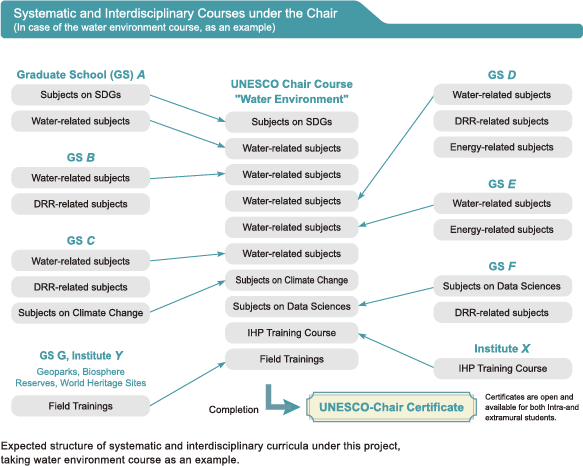Activities
Opportunities for WENDI students
Recommendation for Applicants to the UNESCO Training Program
The Ministry of Education, Culture, Sports, Science and Technology (MEXT) of Japan implements a program that allows young Japanese individuals to gain experience working at the UNESCO Secretariat. This initiative aims to enhance understanding of UNESCO activities, foster globally active human resources including future international organization staff, and promote regional revitalization through engagement with UNESCO activities. Each year, several graduate students are recommended through Kyoto University, and those selected are given the opportunity to undergo training at UNESCO Headquarters in Paris. WENDI actively recommends students enrolled in its programs who wish to participate in this initiative. See the details of “UNESCO Training Program” from the link below
ユネスコ研修プログラムへの参加希望者の推薦について
文部科学省は、日本の若者がユネスコ事務局での勤務を経験することにより、ユネスコ活動に対する理解促進、国際機関職員をはじめとしたグローバルに活躍できる人材の育成、ユネスコ活動を活用した地域活性化等に貢献するプログラムを実施しています。毎年、京都大学を通じて、数名の大学院生が推薦されており、派遣が決まるとパリのユネスコ本部で研修を積む機会が与えられます。WENDI は、本プログラムへの参加を希望する履修生を積極的に推薦します。詳細は以下のリンクにある「ユネスコ研修プログラム」を参照ください。
https://www.kyoto-u.ac.jp/ja/education-campus/student-3/types/program2
Activities of WENDI
- Establishment of comprehensive, interdisciplinary and systematic graduate educational programme in the target fields of water, energy and disaster management. The programme will be a new model of Education for Sustainable Development (ESD) provided in Kyoto University.
- Identifying courses provided by participating graduate schools and departments to develop certification programmes in water environment, disaster and energy. The completion of the programmes by graduate students or course participants will lead to certifications by the UNESCO Chair.
- The Chair will promote integrated research in the field of water-related disaster risk reduction, water resources management, water quality management, energy management, food science, forestry and biodiversity, climate change, and data sciences. The new scientific knowledge obtained will be shared in the education and training programmes including hands-on training in science-based decision-making.
- The Chair will enhance the networking among participating institutes, schools, departments, researchers, students and national and international organizations such as ministries of Japanese governments and UNESCO, FAO, UNISDR, UNU and WMO. It also connects participants with other universities and their research institutes such as Nagoya University, Research Institute for Humanity and Nature (RINH), ICHARM as well as various international organizations or programmes such as IFI, IIWQ, ICL, and GADRI.
- The Chair will develop digital educational materials such as OCW and MOOCs. The materials will particularly benefit practitioners in the field in developing countries. The materials are developed through regular training courses starting from the water and environmental fields but cover disaster and energy fields in broader perspectives.
- The Chair will organize stakeholder workshops to promote an integrated approach to science and policy making. Previous symposia hosted by Kyoto University include UNESCO International Symposium on Scientific, Technological and Policy Innovations for Improved Water Quality Monitoring in the Post-2015 SDGs Framework in Kyoto in July 2015, and UNESCO-JASTIP Joint Symposium on Intra-Regional Water Security and Disaster Management in the Philippines in November 2017.

